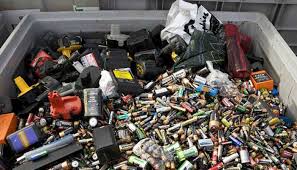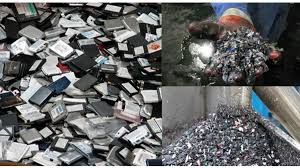Battery waste refers to discarded or used batteries that are no longer functional or have reached the end of their useful life. These batteries can be of various types, including disposable alkaline batteries, rechargeable batteries (such as lithium-ion or nickel-metal hydride), and industrial batteries.
Battery waste is considered hazardous because it often contains toxic chemicals and heavy metals, like lead, cadmium, and mercury, which can be harmful to the environment and human health if not properly disposed of or recycled. Therefore, the responsible management and recycling of battery waste are essential to minimize environmental pollution and promote resource conservation.
Batteries have become an integral part of our modern lives, powering everything from our smartphones to electric cars. However, as these batteries reach the end of their lifespans, they become battery waste, a concern that carries environmental and health implications. Lets explore what battery waste is, its impact, and the solutions for responsible management.
What is Battery Waste?
Battery waste refers to used or discarded batteries that are no longer able to hold a charge or perform their intended function. These batteries come in various types, including common household alkaline batteries, rechargeable lithium-ion batteries found in laptops and smartphones, and industrial batteries used in machinery and vehicles.
Read Also: The Impact of Electronic Waste on Our Environment
The Impact of Battery Waste

Environmental Impact:
1. Toxic Substances: Many batteries contain hazardous materials like lead, cadmium, and mercury, which can leach into the soil and water when improperly disposed of, posing significant environmental risks.
a.Landfill Pollution: When batteries end up in landfills, these toxic substances can contaminate the soil and groundwater, potentially harming ecosystems and wildlife.
b.Resource Depletion: Batteries also contain valuable materials like lithium, cobalt, and nickel. Not recycling them means losing out on these resources.
2. Health Risks: Battery waste can release harmful chemicals into the air, which, when inhaled, can lead to respiratory problems and other health issues. Workers in recycling facilities can be exposed to these toxins if not handled properly.
Solutions for Responsible Battery Waste
1. Battery Recycling: Recycling centers are equipped to safely extract valuable materials from batteries while properly disposing of or neutralizing hazardous substances. Many governments and organizations offer battery recycling programs and collection points to encourage responsible disposal.
2. Collection Programs: Communities and businesses can set up collection programs to gather used batteries, ensuring they don’t end up in the trash. Public awareness campaigns can inform people about the importance of proper disposal.
3. Research and Innovation: Ongoing research aims to develop safer and more eco-friendly battery technologies that reduce the need for toxic materials. Efforts to improve battery longevity and efficiency can reduce the frequency of disposal.
4. Legislation and Regulations: Governments can implement strict regulations for battery recycling and disposal to hold manufacturers and consumers accountable. Some countries have adopted extended producer responsibility (EPR) laws, making manufacturers responsible for the entire lifecycle of their products, including proper disposal.
Battery waste is a pressing concern with significant environmental and health impacts. Responsible management, through recycling, collection programs, research, and legislation, is essential to mitigate these issues.
As consumers, we play a crucial role in the proper disposal of batteries, ensuring that their end-of-life journey is as environmentally friendly as possible. By taking these steps, we can reduce the harm caused by battery waste and work towards a cleaner and safer future.
Taking Action for Battery Waste
1. Recycling: Recycling centers can safely dispose of old batteries by removing hazardous materials. Find local drop-off points for easy battery recycling.
2. Support Collection Programs: Many communities have battery collection programs that ensure proper disposal. Spread the word to help more people participate.
3. Innovation and Longer Lifespan: Scientists are working on safer battery designs with fewer toxic materials. Longer-lasting batteries reduce the need for disposal.
4. Government Rules: Governments can create regulations to ensure responsible battery management, including recycling and safe disposal.
Battery waste may seem small, but its impact on the environment and health is significant. By recycling, supporting collection programs, encouraging innovation, and advocating for responsible management, we can minimize the negative effects of battery waste and create a cleaner, safer world.
Read Also: Sustainable Development: Building a Better Future for All
Process of Recycling Battery and Its Benefits

Recycling is a powerful way to give old things new life and protect our environment. One important item to recycle is batteries. In this article, we’ll explain the process of recycling batteries and why it’s so beneficial, using easy-to-understand language.
The Battery Recycling Process
Recycling batteries isn’t just tossing them in a blue bin; it’s a bit more complex. Here’s how it works:
1. Collection: First, used batteries are collected from various places, like homes, businesses, and recycling centers. These batteries can be of different types, such as rechargeable or single-use.
2. Sorting: Once collected, the batteries are sorted by type. This step is essential because different types of batteries require different recycling methods.
3. Breaking Down: Now comes the interesting part. The batteries are broken down into their basic components. For example, in rechargeable batteries, the metal casing is separated from the chemicals inside.
4. Chemical Recovery: The chemicals inside the batteries, which can be harmful if released into the environment, are neutralized and converted into useful materials. This step is crucial to prevent pollution.
5. Metal Recycling: The metal parts of batteries, like nickel, cobalt, and steel, are melted down and turned into new products. Recycling these metals saves natural resources.
Plastic Recycling: If the battery has a plastic casing, it’s also recycled into new plastic products. This reduces the need for making new plastic from scratch.
Benefits of Battery Recycling
Recycling batteries offers several advantages, and here’s why it’s important:
1. Environmental Protection: Recycling batteries prevents harmful chemicals like lead and mercury from seeping into the soil and water, protecting our ecosystems.
2. Resource Conservation: Valuable metals found in batteries, such as lithium and cobalt, can be reused. This reduces the need for mining and conserves natural resources.
3. Energy Savings: Recycling batteries consumes less energy compared to making new ones from raw materials. It’s an energy-efficient process.
4. Reduced Pollution: Proper recycling ensures that hazardous battery components are safely managed, reducing air and water pollution.
5. Economic Benefits: Recycling creates jobs and contributes to the economy. It’s a win-win for the environment and employment.
Recycling batteries is a simple but impactful way to protect our environment, conserve resources, and reduce pollution. By participating in battery recycling programs and encouraging others to do the same, we can all contribute to a cleaner, greener future. Remember, recycling batteries is not just good for the planet, it also good for our communities and the economy.
Read Also: How to Choose the Right Mason Jar Decor for Your Home

